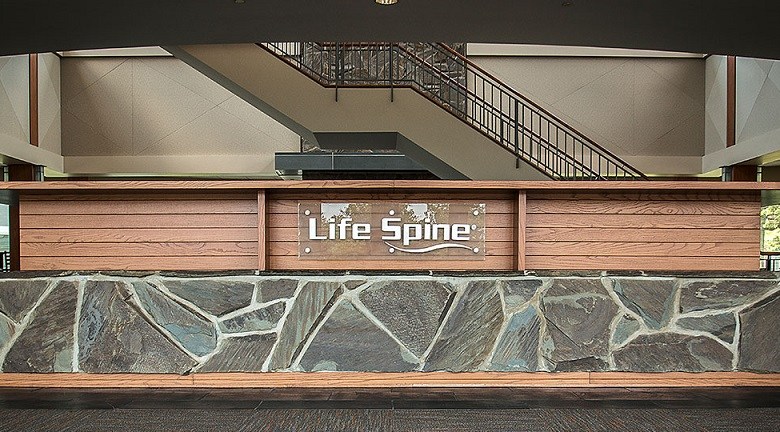

NEW YORK, Oct. 12, 2021 /PRNewswire/ — Imagine knee replacement surgery with a “smart” implant that collects and transmits data enabling an orthopedic surgeon to monitor a patient’s recovery from afar. It became a reality this week when Peter Sculco, MD, and Fred Cushner, MD, orthopedic surgeons at Hospital for Special Surgery (HSS) performed the first knee replacement containing a smart sensor capable of measuring steps taken, walking speed, range of motion and other indicators of knee function following surgery.
An innovation in the growing field of remote patient monitoring, it is the first implantable device approved to collect data on an individual’s progress after a total knee replacement − vital information securely relayed to a cloud-based platform for the orthopedic surgeon to review.
Known as the Persona IQ, the smart knee was granted authorization from the U.S. Food and Drug Administration (FDA) in August. Although the technology doesn’t preclude office visits altogether, it enables the doctor to actively monitor a patient’s recovery with real-world, objective data to supplement their care.
Remote monitoring can be especially useful during the early post-operative period, Dr. Sculco says. “In the first several weeks following knee replacement, hard work is required from the patient, and there can be deviations in recovery that can set people on the wrong path. The earlier you identify a patient who may not be progressing as well as you would like, the sooner you can intervene,” he explains. “This could mean a change in an individual’s physical therapy plan, enhanced patient education, anti-inflammatory medication or the use of an ice machine. When I go into the exam room to see a patient at the six-week follow-up visit, I should have a very granular understanding of how his or her recovery is going.”
The smart knee contains a sensor that is integrated into the joint replacement prosthesis. Once implanted, it records and wirelessly transmits gait data and other information to a personal base station, about the size of a modem, that plugs into an outlet at the patient’s home. The data is then securely sent to a cloud-based platform where the orthopedic surgeon can review it and check on the patient’s progress and recovery.
“The smart knee uses the same material and technology found in implanted cardiac devices such as pacemakers,” explains Dr. Cushner, who is also a founder and chief medical officer of Canary Medical, the company that designed the sensor technology. “It collects data every day during the first year following surgery, providing objective, accurate information on how the knee is functioning. Patient monitoring can continue for much longer, though, as the battery that powers the device was made to last at least 10 years.”
Dr. Sculco notes that as time goes by and more patients receive the smart implant, it has the potential to amass a vast amount of information on gait metrics following knee replacement. Down the road, orthopedic researchers could potentially use data analytics and machine learning to translate that information into evidence-based recommendations to ultimately improve outcomes and enhance patient care.
About HSS
HSS is the world’s leading academic medical center focused on musculoskeletal health. At its core is Hospital for Special Surgery, nationally ranked No. 1 in orthopedics (for the 12th consecutive year), No. 4 in rheumatology by U.S. News & World Report (2021-2022), and the best pediatric orthopedic hospital in NY, NJ and CT by U.S. News & World Report “Best Children’s Hospitals” list (2021-2022). HSS is ranked world #1 in orthopedics by Newsweek (2020-2021). Founded in 1863, the Hospital has the lowest complication and readmission rates in the nation for orthopedics, and among the lowest infection rates. HSS was the first in New York State to receive Magnet Recognition for Excellence in Nursing Service from the American Nurses Credentialing Center five consecutive times. The global standard total knee replacement was developed at HSS in 1969. An affiliate of Weill Cornell Medical College, HSS has a main campus in New York City and facilities in New Jersey, Connecticut and in the Long Island and Westchester County regions of New York State, as well as in Florida. In addition to patient care, HSS leads the field in research, innovation and education. The HSS Research Institute comprises 20 laboratories and 300 staff members focused on leading the advancement of musculoskeletal health through prevention of degeneration, tissue repair and tissue regeneration. The HSS Global Innovation Institute was formed in 2016 to realize the potential of new drugs, therapeutics and devices. The HSS Education Institute is a trusted leader in advancing musculoskeletal knowledge and research for physicians, nurses, allied health professionals, academic trainees, and consumers in more than 130 countries. The institution is collaborating with medical centers and other organizations to advance the quality and value of musculoskeletal care and to make world-class HSS care more widely accessible nationally and internationally. www.hss.edu.
SOURCE Hospital for Special Surgery








